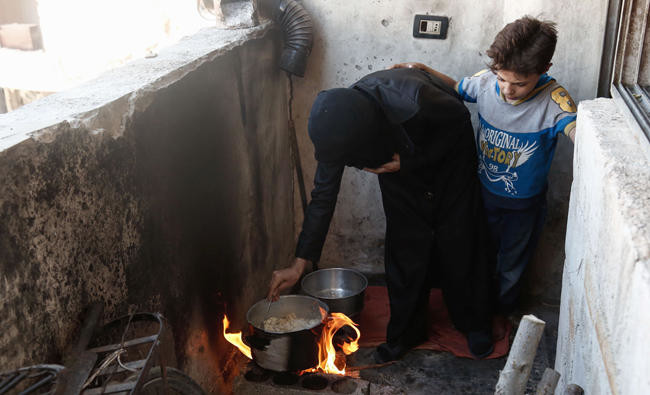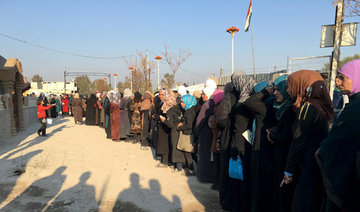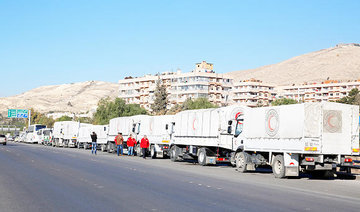DOUMA, Syria: In a humid room in the besieged Syrian town of Douma, Abu Nabil inspects the pearly white mushrooms sprouting from white sacks hanging from a ceiling.
The oyster mushrooms poking out from holes in the bags are now a substitute for meat in the fighter stronghold, where a government blockade has created food shortages.
Abu Nabil walks between the sacks inspecting the clusters of mushrooms emerging from the plastic and checking the internal temperature to ensure conditions are optimal for the unusual crop. Mushrooms are not a common crop in Syria, and rarely feature in local cuisine.
But in the Eastern Ghouta region, a key fighter bastion outside the capital Damascus, years of government siege have put traditional staples like meat far beyond the reach of ordinary people.
The Adala Foundation, a local NGO, began thinking about ways to help residents in need of nutritious alternatives.
“We turned to cultivating mushrooms because they’re a food that has high nutritional value, similar to meat, and can be grown inside houses and basements,” said Abu Nabil, an engineer who is project director.
“We were looking for a good source of proteins and mineral salts as an alternative to meat, which is very expensive,” added Adala’s director Muayad Mohieddin.
“We discovered the idea of mushrooms as a solution.”
Eastern Ghouta has been under siege since 2013, leaving locals to rely on food produced locally or smuggled in through tunnels or across checkpoints.
While the area was once an important agricultural region for Syria, mushrooms were not a local crop.
“This type of cultivation was totally unknown in Ghouta before the war,” said Mohieddin.
“We learned about it by searching on the Internet for places in similar (wartime) situations to Eastern Ghouta,” he added.
The NGO discovered mushroom farming required neither large amounts of space, nor major financial investment, making it a good fit for their needs.
To cultivate the mushrooms, the project’s workers begin by sandwiching thin slices of high-quality mushroom between pieces of carton and placing the samples in sterile plastic containers.
Over the course of 15-25 days, the mushroom slivers begin to process fungus that is then removed and mixed with sterlized barley grains to create “seeds.”
Next, straw that has been boiled until sterile and then drained is placed on a table and sprayed with gypsum to prepare it for the “seeds.”
Finally, the straw is packed into the sacks, with the mushroom starters sprinkled at intervals on top of the straw as it is layered in.
The bags are transferred to a room known as an incubator where they are suspended from the ceiling for between 25 to 45 days, and each produces between four and five mushroom harvests before being replaced.
The project relies on generators to keep conditions steady at 25 degrees Celsius and 80 percent humidity.
But with fuel also in short supply and expensive, the generators are fed with a locally produced fuel that is extracted from plastic.
In the three months since the project began, the NGO has distributed mushrooms across Douma and other parts of Eastern Ghouta free of charge.
“We distribute nearly 1,300 kilograms of mushrooms a week to 600 people,” said Abu Nabil.
“The distribution is free for the poorest families, and for those suffering malnutrition or spinal cord injuries that need lots of nutrients,” he added.
It’s a major boon for people like Um Mohammed, a mother of four, who can only dream of affording meat at prices of around $10 a kilogram.
“If you’re able to get mushrooms, it’s a huge blessing,” the 50-year-old said.
“It’s as though you’re eating a dish of fish or chicken or meat,” she added, preparing a dish in her sparsely furnished home, wearing a black robe and headscarf.
Abu Adnan Al-Sidawi, 30, had never even tasted mushrooms before he received them through the project.
“I received a bowl of mushrooms three or four weeks ago,” said Sidawi, who suffered multiple fractures in his leg and back in an airstrike in April.
“I didn’t know what they were and I’d never eaten them before. I learnt how to cook them from the Internet,” he said.
“On the first day, I fried them up with some onions, and on the second day, I cooked them in a yoghurt sauce,” he said, lying on a bed in his house.
“We liked them in the yoghurt sauce,” he said with a smile.
Like many adults in Douma, the city’s children were also unfamiliar with the ingredient.
At one psychosocial center, the children saw mushrooms for the first time when they were distributed during Ramadan, an employee said.
“I organized a small workshop to teach them about it and how it is cooked,” said the employee, who asked to be identified as Rasha.
“When I showed it to them, they said to me: ‘Miss, what is that? A flower?’”
Besieged Syria town swaps meat for mushrooms
Besieged Syria town swaps meat for mushrooms

Israel strikes Yemen’s Sana’a airport, ports and power stations

- Houthis said that multiple air raids targeted an airport, military air base and a power station in Yemen
JERUSALEM: Israel’s military said it struck multiple targets linked to the Iran-aligned Houthi movement in Yemen on Thursday, including Sana’a International Airport and three ports along the western coast.
Attacks hit Yemen’s Hezyaz and Ras Kanatib power stations as well as military infrastructure in the ports of Hodeidah, Salif and Ras Kanatib, Israel’s military added.
The Houthis have repeatedly fired drones and missiles toward Israel in what they describe as acts of solidarity with Palestinians in Gaza.
The Israeli attacks on the airport, Hodeidah and on one power station, were reported by Al Masirah TV, the main television news outlet run by the Houthis.
More than a year of Houthi attacks have disrupted international shipping routes, forcing firms to re-route to longer and more expensive journeys that have in turn stoked fears over global inflation.
Israel has instructed its diplomatic missions in Europe to try to get the Houthis designated as a terrorist organization.
The UN Security Council is due to meet on Monday over Houthi attacks against Israel, Israel’s UN Ambassador Danny Danon said on Wednesday.
On Saturday, Israel’s military failed to intercept a missile from Yemen that fell in the Tel Aviv-Jaffa area, injuring 14 people.
Syria authorities say torched 1 million captagon pills

DAMASCUS: Syria’s new authorities torched a large stockpile of drugs on Wednesday, two security officials told AFP, including one million pills of captagon, whose industrial-scale production flourished under ousted president Bashar Assad.
Captagon is a banned amphetamine-like stimulant that became Syria’s largest export during the country’s more than 13-year civil war, effectively turning it into a narco state under Assad.
“We found a large quantity of captagon, around one million pills,” said a balaclava-wearing member of the security forces, who asked to be identified only by his first name, Osama, and whose khaki uniform bore a “public security” patch.
An AFP journalist saw forces pour fuel over and set fire to a cache of cannabis, the painkiller tramadol, and around 50 bags of pink and yellow captagon pills in a security compound formerly belonging to Assad’s forces in the capital’s Kafr Sousa district.
Captagon has flooded the black market across the region in recent years, with oil-rich Saudi Arabia a major destination.
“The security forces of the new government discovered a drug warehouse as they were inspecting the security quarter,” said another member of the security forces, who identified himself as Hamza.
Authorities destroyed the stocks of alcohol, cannabis, captagon and hashish in order to “protect Syrian society” and “cut off smuggling routes used by Assad family businesses,” he added.
Syria’s new Islamist rulers have yet to spell out their policy on alcohol, which has long been widely available in the country.
Since an Islamist-led rebel alliance toppled Assad on December 8 after a lightning offensive, Syria’s new authorities have said massive quantities of captagon have been found in former government sites around the country, including security branches.
AFP journalists in Syria have seen fighters from Islamist group Hayat Tahrir Al-Sham (HTS) set fire to what they said were stashes of captagon found at facilities once operated by Assad’s forces.
Security force member Hamza confirmed Wednesday that “this is not the first initiative of its kind — the security services, in a number of locations, have found other warehouses... and drug manufacturing sites and destroyed them in the appropriate manner.”
Maher Assad, a military commander and the brother of Bashar Assad, is widely accused of being the power behind the lucrative captagon trade.
Experts believe Syria’s former leader used the threat of drug-fueled unrest to put pressure on Arab governments.
A Saudi delegation met Syria’s new leader Ahmed Al-Sharaa in Damascus on Sunday, a source close to the government told AFP, to discuss the “Syria situation and captagon.”
Jordan in recent years has also cracked down on the smuggling of weapons and drugs including captagon along its 375-kilometer (230-mile) border with Syria.
Jordan says 18,000 Syrians returned home since Assad’s fall

AMMAN: About 18,000 Syrians have crossed into their country from Jordan since the government of Bashar Assad was toppled earlier this month, Jordanian authorities said on Thursday.
Interior Minister Mazen Al-Faraya told state TV channel Al-Mamlaka that “around 18,000 Syrians have returned to their country between the fall of the regime of Bashar Assad on December 8, 2024 until Thursday.”
He said the returnees included 2,300 refugees registered with the United Nations.
Amman says it has hosted about 1.3 million Syrians who fled their country since civil war broke out in 2011, with 650,000 formally registered with the United Nations.
Lebanon hopes for neighborly relations in first message to new Syria government

- Lebanon’s Iran-backed Hezbollah played a major part propping up Syria’s ousted President Bashar Assad through years of war
- Syria’s new Islamist de-facto leader Ahmed Al-Sharaa is seeking to establish relations with Arab and Western leaders
DUBAI: Lebanon said on Thursday it was looking forward to having the best neighborly relations with Syria, in its first official message to the new administration in Damascus.
Lebanese Foreign Minister Abdallah Bou Habib passed the message to his Syrian counterpart, Asaad Hassan Al-Shibani, in a phone call, the Lebanese Foreign Ministry said on X.
Lebanon’s Iran-backed Hezbollah played a major part propping up Syria’s ousted President Bashar Assad through years of war, before bringing its fighters back to Lebanon over the last year to fight in a bruising war with Israel – a redeployment which weakened Syrian government lines.
Under Assad, Hezbollah used Syria to bring in weapons and other military equipment from Iran, through Iraq and Syria and into Lebanon. But on Dec. 6, anti-Assad fighters seized the border with Iraq and cut off that route, and two days later, Islamist militants captured the capital Damascus.
Syria’s new Islamist de-facto leader Ahmed Al-Sharaa is seeking to establish relations with Arab and Western leaders after toppling Assad.
Iraqi intelligence chief discusses border security with new Syrian administration

BAGHDAD: An Iraqi delegation met with Syria’s new rulers in Damascus on Thursday, an Iraqi government spokesman said, the latest diplomatic outreach more than two weeks after the fall of Bashar Assad’s rule.
The delegation, led by Iraqi intelligence chief Hamid Al-Shatri, “met with the new Syrian administration,” government spokesman Bassem Al-Awadi told state media, adding that the parties discussed “the developments in the Syrian arena, and security and stability needs on the two countries’ shared border.”
















